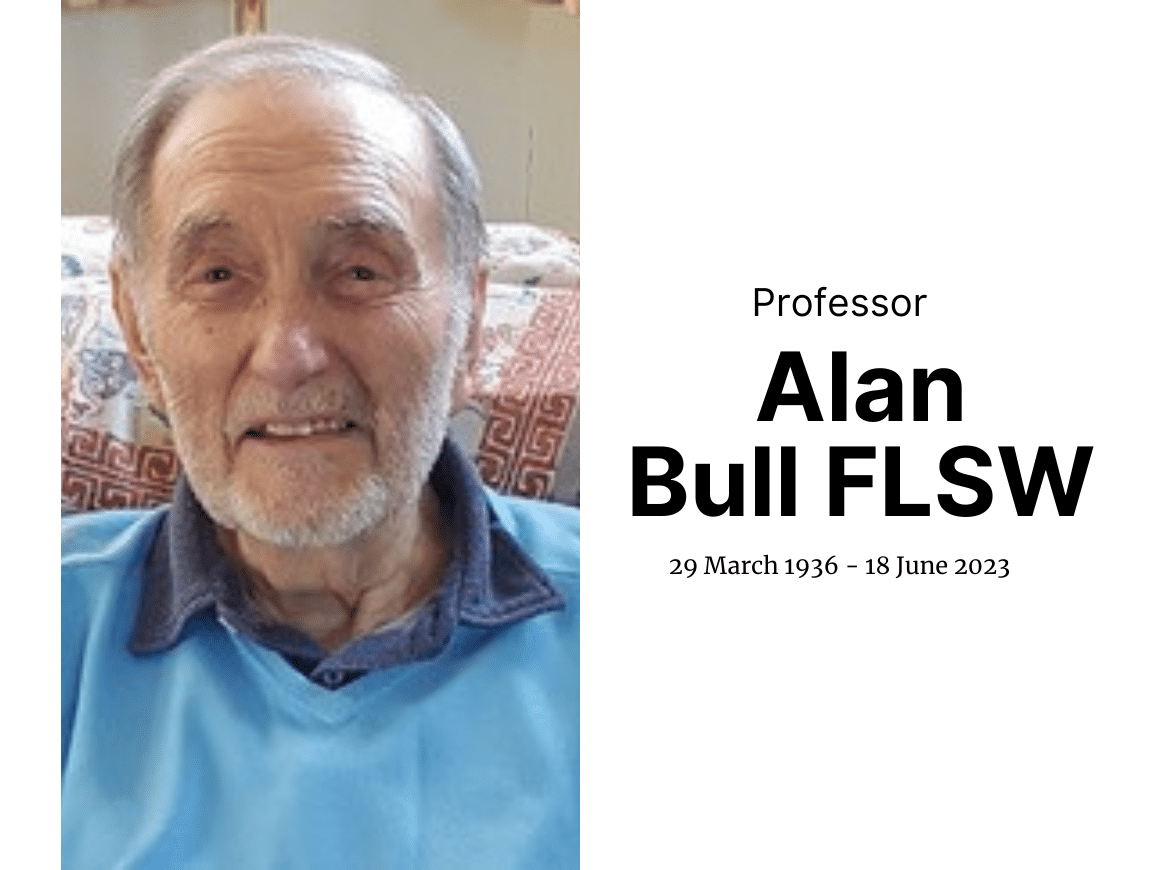Er Cof am yr Athro Alan Bull FLSW

Trist iawn oedd clywed am farwolaeth yr Athro Alan Bull FLSW ym mis Mehefin, ond rydym yn falch o allu rhannu darn a ysgrifennwyd er cof amdano gan ei gydweithiwr yr Athro J Howard O Slater. Cyhoeddwyd darnau eraill er cof amdano yn The Guardian a gan Brifysgol Caint, lle buodd yr Athro Bull yn gweithio am gyfnodau pwysig o’i yrfa.
With great sadness we learned of the passing of Alan Bull in June after a period of ill-health. Alan had the most ebullient approach to life. He was so enthusiastic in everything he did as a scientist, his many cultural passions, and with his family and many friends.
His physical roots were in Derbyshire where his love of Derby County Football club and sometime manager Brian Clough kindled a lifelong passion. His heart and original cultural enthusiasms came from Cymru (Wales) through his mother’s lineage explaining his devotion to Welsh Rugby Union and choral
singing, in no particular order, but idyllically combined on match days. In the middle stage of his academic career for six years he was Professor of Microbiology at the University of Wales Institute of Science and Technology in Cardiff. It was his great pleasure that Gareth Davies, Wales’ fly-half and British
Lion, was his tutee.Alan’s education flourished at Nottingham University studying botany; at that time microbiology was emerging as a multidisciplinary subject from the shadows of medical bacteriology. He moved to lectureships first at Bedford College, then Queen Elizabeth College where he was influenced by Professor
John Pirt, beginning his long research interests in culturing microbes, initially fungi, setting in train his entry into many facets of biotechnology. After a sabbatical year with Professor Martin Alexander at Cornell University, Ithaca, through a Fulbright Fellowship, he developed a permanent interest in
environmental microbiology, the basis (excuse) for numerous world-wide collecting expeditions.With an international reputation Alan was a foundation appointment as Reader in Microbiology in the new Biological Laboratory established at the University of Kent at Canterbury, under Director Professor Ken Stacey. He started work in temporary accommodation in the Beverley farm building whilst Laboratory
construction was in progress, days often ending with a game of bar billiards in the Old Beverley. He played a major role in quickly establishing the University’s microbiology, and wider biology, identity, leading the way into the biotechnology revolution. He inspired undergraduate and postgraduate students
through his wide knowledge, detailed preparation and friendship. He gave his time to guiding and mentoring an eclectic mixture of newly appointed academics, generations of students and regular stream of overseas visitors and collaborators. Indeed, if there is a prime mark of his personality it was his innate
ability to build many lasting friendships in the UK and around the world, frequently with smiles and handshakes likely to remove the arm of the unprepared! For his university contribution it was entirely fitting that Alan succeeded Ken as Director of Biological Sciences.In 1974 Alan was persuaded by Professor Harry Smith, then Treasurer of the Society for General Microbiology to assume executive responsibility as General Secretary. Alan held this position from 75 to 79, in dynamic duo partnership with Harry as President. He certainly was the first of the new young breed of academics who began to influence their professional society, representing general microbiology and virology, quickly recognising the need to evolve and develop a much more efficient and active body. By this time Alan had a wide knowledge of organising science through his international networks in Europe
and beyond. Inevitably he was a meticulous, efficient organiser, quick to see a need for strategic long term policy decisions. Arguably his tenureship was key to modernising the Microbiology Society (as the old SGM is now known).He was grounded by numerous cultural activities (and more occasional sporting ones). One that springs to mind, in collaboration with others, was a National Heritage Arts Sponsorship award which enabled productions of Bernstein’s operetta of Voltaire’s novella “Candide” at the University, and (thankfully
separately) Verdi’s Requiem, the latter sung in Canterbury Cathedral, with Alan in the choral bass section. In the same period, whilst leading a UK sponsored biotechnology initiative to Indonesia, there was an open air performance of the Sanskrit epic “Ramayana”, several gamelan concerts (with or without puppet
shows), all rounded off with an expedition to find the last few remaining Javan rhinos struggling for survival in the rejuvenated rainforest following the Krakatoa eruption. The last failed but was not an unmitigated disaster since Alan recovered rhino faecal matter with microflora from a well-used wallow,
assuring expenses for a microbe collecting effort. He also acquired, for a few rupiah, a large (heavy) bronze gamelan gong which caused much difficulty during the return journey.The bed rock of his life was his family. His wife Jenny, a fellow Nottingham student and biology teacher; his daughter Rachel, a gardener; son Adam, a sculptor; and grandson Vincent, a business man. We assure them deeply that we mourn with them and now also, as the family have requested, we celebrate an
Professor J Howard O Slater
extraordinary career, but above all a wonderful, kind and generous human being.
Somerset